Dirk Rivers “The Beginning”
Part Two of the Bob Vogel Story was conducted as an interview with Bob Vogel, Dick Vogel, Doug Taylor and Kim Rush. This piece focuses on how the Dirk Rivers band originated, from 1972 through the summer of 1975, when the Vogel Brothers Band trio was created. This interview focuses on day to day life around the Vogel camp as their music and their lives were intertwined.
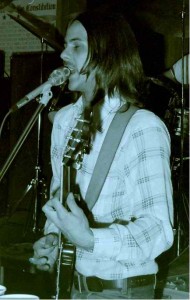
Bob Vogel
KIM RUSH: Bob, you were strictly an acoustical guitar player previous to 1973. When did you get into playing the electric guitar?
BOB VOGEL: Early in 1973, my brother Dick and I began jamming on various tunes including “Coming into Los Angeles,” by Arlo Guthrie. We did this upstairs of our parent’s home at Palmer and Lafayette N.E. I was working hard at learning how to play the electric guitar and Dick was playing the drums. Dick had played drums in a few bands as a teenager. At that time I had a Vox 12-string electric guitar that was shaped like a drop of water.
KIM RUSH: I’m assuming it was a little odd getting used to playing the electric guitar back then, after being used to the “feel” of the acoustic guitar and the ukulele for over ten years?
BOB VOGEL: The only real problem that I was aware of then was that I really did not know how to play the electric guitar! Bernie Ruschmann was the one to show me the pentatonic scale that I still use extensively today. Bernie was really into country blues music, which was uncommon in Grand Rapids at that time.
KIM RUSH: I suspect you’re being modest when you say that you did not know how to play the electric guitar, but I realize that there are huge differences between playing electric and acoustic guitars. They certainly are totally different instruments!
This Vox 12 string “teardrop” electric guitar (Mark XII) is similar to the first electric guitar that Bob owned, but his was white. Brian Jones of the Rolling stones popularized this guitar.
BOB VOGEL: Our plan at that time was to put a band together, and this is how we got started. It is remarkable how patient my parents always were with the noise levels. Of all the things I love about my parents, I have to admit that they never interfered with my practicing. While I was learning the electric guitar my dad would go down to the basement when he was tired of it or needed to go to bed. Using the circuit breaker which controlled the upstairs, he’d flash the upstairs lights on and off to let me know he wanted me to stop. I don’t blame him for this as I always enjoyed playing very loud and it also saved him a trip upstairs. I thought it was very funny the first time it happened. You have to remember that sometimes this would occur after hours of playing the same lick over and over. With an electric guitar it is a little hard to be subtle.
I bought a Martin acoustical guitar around the beginning of 1973, and the banjo shortly thereafter. I learned how to play the banjo right after I heard the music from the movie “Deliverance” in 1972. When I was learning the banjo was the only time my Dad asked me to stop playing because it was driving him crazy. I did most of my practicing when no one was home so this did not happen very often. Practice is a very personal time and I have always rehearsed in isolation.
“The Queen Street Experience”
BOB VOGEL: Sometime during 1973 my brother Doug and I decided to look for a place to live and we found 1557 Queen Street N.E., not far from my parent’s house. I don’t remember exactly how we found it, but the rent was $150.00 per month and we thought we could handle that. I think Fran, the landlord, had just fixed it up to rent. We were lucky to get that place.
Chet Roberts moved in with Doug and I, and eventually other people started to move in. My brother Dick, then you (Kim), and then Chet’s brother Earl. Doug and I met Chet at Dick’s apartment. Chet is a great guy and is still one of my best friends. Chet invited Dick and his brother Earl to move into Queen Street. I was working at Keeler Brass when I moved in. I worked there for exactly one year and quit to start gigging with Dirk Rivers. There were two bedrooms up and we did a good job of converting the basement into a bedroom and great room. I don’t remember when Craig Breckon moved in but he was there just about from the start. Craig was younger than us, seems like he was still in high school. He worked at the Checkerboard convenience store on Plainfield, a short walk from Queen Street. That’s where we met Craig.
KIM RUSH: I moved into Queen Street, during the winter of ‘73/’74. You and Dick were already living there and jamming in the basement. You guys sounded great and I wanted to jump in with your fun. I had never played bass before but played some guitar. We located Joe Sarnicola who had played bass with Phlegethon. He had a Gibson EBO that he sold to me. You guys fronted me the money for it, and that got me into the mix! Boy, that was fun, even though I was just learning. We jammed for hours at a time, as I recall, just trying to find a groove and learning how to listen to each other to create our sound. I recall the choppy rhythms and ‘fills’ you were already using in those early days, in the basement of Queen Street, on your Gibson SG. You were filling in the holes. That was really the heart of the early Dirk Rivers sound in my opinion. So many strangers came and went from Queen Street. I suppose they were curious about what was transpiring there and just wanted to listen for a while. Lately I like to call it the Queen Street experience, just for grins. You could hear the music all around the block. I noticed that occasionally the police would park across the street from our house with their car windows down, listening to the rehearsals. Actually, the neighbors and police were very tolerant, don’t you think? The police would come to our front door on a regular basis, just doing their duty. They would knock and ask us to turn it down or stop if it was really late, but I don’t recall them getting very upset with us.
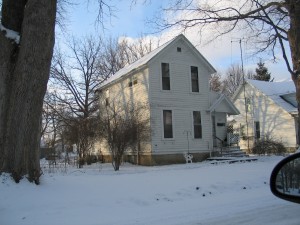
1557 Queen St.
BOB VOGEL: Sometime between 1973 and 1975 we received a letter of complaint from the U.S. Environmental Protection Agency, concerning excess noise at Queen Street. I sure wish I would have saved that letter.
KIM RUSH: Me, too. I’d love to see that! I think that back then we knew that our music was more effective and powerful if it was loud. What do you recall, Doug Taylor? [Editor’s note: Doug Taylor and Kim Rush did not know each other back then. They met two years ago and are now Co-editors of West Michigan Music Hysterical Society website.] You told me you were at Queen Street though I do not recall meeting you back then. So many people came and went through those doors. Doug told me that he remembers being at Queen Street when we were jamming in the basement during the winter. Do you think it was loud? What was your impression of the Queen Street experience?
DOUG TAYLOR: Recently I found out from Bob that Dick was friends with Dan Herringa, Brett McCallim and Marty Straayer. They knew Chet Roberts, who was living at Queen Street. So I’m assuming that after I got out of the Air Force in 1973 I was hanging around with Dan, Brett and Marty and they told me to check out Queen Street and the band. I went there one night during the winter by myself and the band was getting ready to practice. They were set up in the basement. Bob locked me in the house with the band and they started to play. At the time I did not understand why he locked the doors. Talk about loud!! They sounded good, and I was having fun, but after a while I started to get paranoid and wanted to leave. I felt trapped. I wanted to get out of there but did not dare to open the door once Bob had locked it. Bob had told me that if you leave, have somebody lock the door behind you. Well, everybody was playing and I didn’t want to interrupt the jam, so I bit the bullet and waited until they took a break. Then I was out of there like a bullet. I had been working the clubs as a bartender in Grand Rapids for the better part of ten years and had heard a lot of good show bands, so I was use to loud music, but NOT in this otherwise quiet neighborhood.
KIM RUSH: I wonder if other people that visited Queen Street felt the same way as you did? I was oblivious about what other people were thinking while I was playing. We came together as a band quite gradually. Bob and Dick and I had gone to church together at Trinity Baptist since we were in junior high. During that time, I had become totally enamored with Bob’s talent as a singer and guitarist. I had sung for a band named Bad Manor in 1971-1972, and still had remnants of a P.A. system. I tried to sell it to another band but they didn’t make payments for months so I drove out into the countryside to a barn where they rehearsed and repossessed the P.A. It didn’t take me long to get the itch to try to form another band with Dick and Bob once I saw them jamming in the Queen Street basement. Best as I recall, after a few months of basement jams we moved our equipment upstairs into the largest room on the first floor.
BOB VOGEL: We were not set up downstairs very long. I can’t remember exactly why, although I have a feeling that when we brought in those big P.A. speakers that you owned, we did not want to lug them up and down those basement stairs. Those stairs were very narrow and steep. You provided the first P.A. system for Dirk Rivers. You even had some microphones.
KIM RUSH: Do you recall how you’d always lock the doors to the house before the band rehearsed? Why did you do that? Were you afraid that we’d get busted?
BOB VOGEL: It had nothing to do with that. Although it makes sense that we would not want a surprise visit from the police. I still get angry if I am interrupted during rehearsal. With all the traffic that came in and out of Queen, we simply could not have gotten anything done if we had an open door policy. I would do the same thing today for the same reasons.
KIM RUSH: It’s funny, but I never picked up on the real reason you were locking us in. 1557 Queen Street was a small house. But there were always five to six people living there. Doug Vogel and Craig helped the band immensely, and in so many ways. I used to set up the PA and then we’d just get up and play. After I left, Doug was the official sound man for many years with you guys, and he did a great job.The patience displayed by all of the people living at Queen Street was amazing. I’m sure it was totally impossible to get any peace and quiet, at least while we were rehearsing.
BOB VOGEL: Remember Kirk Zillmer?
KIM RUSH: Kirk is still a very close friend and I talk to him almost every week. Lead guitarist Kirk Zillmer was in my first band, Bad Manor. He is super funny, an impressive guitarist and a wonderful friend, so I talked you and Dick into having him play with us.
BOB VOGEL: At that point, Kirk was more advanced on electric guitar than I was. He was really good!
KIM RUSH: We all worked hard during the summer of 1974, putting some songs together so that we could make some money playing around town. We got one of our first jobs at the Brass Monkey on Alpine and unfortunately, Kirk came down with a temporary medical condition. He could not make this engagement so I asked Jerry Davis, the rhythm guitarist with Bad Manor, to step in. Jerry ended up staying with us until summer of 1975, when the band broke up. I still feel bad about what happened with Kirk and us, and I trust that he has forgiven me. We have discussed it openly and we will always be close friends. Kirk and I also played together in the late 70s until 1987. Kirk never quit playing and is in a band now called Double Barrel. He started playing in front of the public in junior high. He was with a band called the Dimensions at that time and they won a battle of the bands. He’s always had something going musically. It’s deep in his blood.
Once we played at the Brass Monkey, more opportunities came our way. Bob named the band Dirk Rivers. He saw an Elvis Presley movie (“Loving You,” from 1957) where Elvis played the part of Deek Rivers. Bob changed the name slightly, whimsically reflecting on our new “roles” as rock musicians. We played at college fraternity and high school dances, at nightclubs as far away as Park City, Illinois, and three concerts at the Thunderchicken on Alpine. We backed up Rory Gallagher, James Gang and T. Rex. We also played at Westgate, Olde Place at the Morton Hotel, and Putt-Putts. We also recorded twice, once at Arlen Smith’s home studio and also at Cinema Sound on South Division, on April 10, 1975. It cost us 150.00. I think that we recorded with Arlen before we went to Cinema Sound.
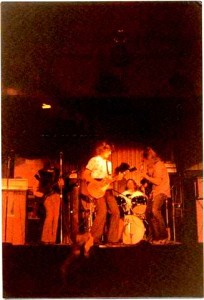
Dirk RiversThunderchicken 1975 Kim Jerry Dick Bob
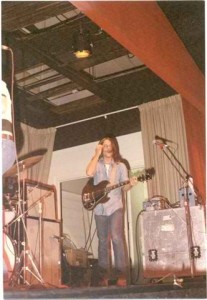
Bob Vogel at Thunderchicken with Dirk Rivers 1975
BOB VOGEL: Kiss played at the Thunderchicken one night back then. They were playing the bar circuit before they hit it big and Thunderchicken was one of their stops. I don’t think we played the same night, but we were playing the same club at that time. This would have been just before they made it big. I remember standing next to Gene Simmons and I could not believe how tall he was. They had their makeup on and Gene was spitting blood. (editors note: this Kiss concert was held on October 17, 1974)
KIM RUSH: I was not there with you that night, but have heard that they played there before they became famous. That was quite the club at that time, with a nice large stage and a good P.A. system. We didn’t have to drag ours over there. It was near 6 Mile Road, on Alpine. They also had a “sunken” dance floor below the level of the stage. It was definitely the nicest club in Grand Rapids at that time.
DICK VOGEL: Bob tried his hand at writing some rock songs in those early days of Dirk Rivers, and we performed these songs when we played out and recorded a few of them. I felt like they were good songs.
KIM RUSH: Me too! I dug out an old song list for our band and asked Dick which songs he sang. Dick sang a lot of the tunes! And Jerry sang a couple, too. I really loved our practice sessions and the excitement of working on our own songs. Bob kept the music well arranged and sounding good. Even with the band blaring, he could hear the mistakes we were all making and correct them, taught us vocal harmony parts which fit the songs well, and even created arrangements and specific parts for the instruments which made everything sound better. It was a huge learning process for me, and I loved it. Like Dick told me recently, “once you play with Bob, how do you top that?” Bob Riley told me that he had a hard time catching up with Bob when he played with you guys. That somehow made me feel a little better, as I felt the same way, and Bob Riley was a far more experienced bass player than me.
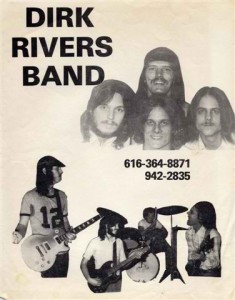
Dirk Rivers Poster
BOB VOGEL: I was no songwriter and never wanted to be one. Even to this day I have no desire to write songs.
KIM RUSH: Wow, I don’t think Dick and I ever knew that you felt that way back then!
DICK VOGEL: Remember the “Fourth of July” song endings? Bob came up with that term to describe the loud, suspended, crazy endings that we were over-using on our songs. He was really sick of the same old ending for every song and tried to get us to learn some more creative endings.
KIM RUSH: I’m glad we kept our sense of humor throughout those days. We were broke and always looking for work, but we sure had some laughs and lots of fun!
BOB VOGEL: Kim, we met our wives while living at Queen Street. I met my wife Karen in 1975 . We actually hooked up at The Old Place. We have been married 36 years now.
KIM RUSH: I remember when you met Karen and how crazy you were about her. Mike McGee introduced me to my ex-wife, Chris. Right at Queen Street!
KIM RUSH: Living with the Vogel brothers included having the ultimate free entertainment committee at your service. There was plenty of idle time between practices and engagements. We were very young and full of energy and somewhat creative about finding fun things to do. One form of amusement was catching trains in Comstock Park and riding them to Baldwin and back. I had heard of hobos catching trains and riding them to their next destination, but never thought I’d be trying it myself.
Someone must have planned our trip, because the boarding and unboarding procedure would have been a real problem if the train did not at least slow way down so that we could hop on and off. I don’t recall bringing a lunch and had no idea how long this would take, but it sounded interesting. I do recall being warned not to get caught while we were in transit, because railroad personnel would throw us off the box car and we would have a hard time getting back home.
Basically, we drove to Comstock Park to a place where the train slowed down considerably as it passed through.
About six of us jumped through the open door of the box car and then enjoyed the scenery and the ride all the way to Baldwin. Once we reached that area, the train again slowed down and we jumped out. Then we waited for another train to pass by and jumped on to that, going back home. The process of getting off and on trains required some athleticism and coordination. You only had a minute or so to get off and the same amount of time to get back on the train. Some of us were better than others at this feat. I was one of the least talented.
Can you help me recall memories of riding this train to Baldwin. Did we get on in Comstock Park and get off in Baldwin?
DICK VOGEL: Yup! That was brother Dougs’ brainstorm. Earl Roberts, Doug & I took the first ride. I’ll never forget it. Jumping a freight train around midnight, at Comstock Park and not really knowing when it might stop or where it was going! We hooked up with 3 other “hobos.” They helped us get off at Baldwin and then jump another southbound train which took us right back to where we started. What an adventure, huh? Seems I remember you jumping off and landing on your face? OUCH!!! Damn, we had some fun didn’t we?
KIM RUSH: Man, you sure have a great memory. What a gift! We sure did have a ton of fun. I landed on my head and saw stars. Luckily it was not right on my face.
DOUG TAYLOR: I have not heard that story before, but now that I did I have to supply another editorial note: “This is totally illegal and extremely dangerous (life threatening) and this website wants to make it very clear that we are not recommending this practice to anyone at any time. Do not attempt to do this.”
DOUG TAYLOR: Now I come from a “railroad family,” as my dad was a railroad enthusiast, historian and a big model railroader. My brother designed new routing connections for a lot of railroad companies. I worked for a short time for the C&O railroad (which is now CSX.) It was the same railroad company’s tracks that your hobo train ride was on.
I heard the story from several people from the Vogel “camp” about people taking an automobile ride down the railroad tracks. I heard similar stories for years while growing up around a “railroad family” and doubted all of them. Until now, I figured car wheels would not match up with the tracks or stay on the tracks. So, I grabbed my tape measure and went out and measured the wheelbase of my car, already knowing the width between the train rails was four feet, eight and one half inches. Check out this link: http://www.snopes.com/history/american/gauge.asp which discusses the history of gauging. It’s very interesting. After reading this you’ll find out that it is definetely possible to get a car on a railroad track.
So every one of the stories I heard about the car rides on the train tracks were similar, but who had the right one? Kim, you go first!!!
KIM RUSH: Based on foggy recollections from 38 years ago, here’s what occurred: Dick, Doug, and Bob Vogel, Craig Breckon and I took a car ride to Comstock Park from Queen Street in Dick’s 1966 Plymouth Fury 1.
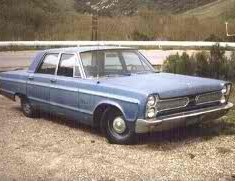
1966 Plymouth Fury 1 4 Door
We ended up somewhere near where the Whitecaps baseball park and the White Pine bicycle trail is now. The railroad tracks which once ran north and south from West River road were removed in the mid 1990s to create a walking and bicycle trial.
Occasionally we took drives to break the boredom, so it was nothing unusual for us to go out cruising. I do not recollect if I was told ahead of time what was going to transpire, but I doubt it. Once we arrived, we pulled off of the road near the railroad tracks, and Dick jumped out and let a little air out of his tires. In 1975 this was still the outskirts of Grand Rapids and was not as busy and populated as it is now. Once Dick got back in the driver’s seat, he very slowly and carefully drove the car up on to the railroad tracks! All of a sudden, there we were moving at a crawl down the railroad tracks toward West River Drive, heading north, into the woods!! I couldn’t believe it! I thought that he had to be out of his mind!
You have to realize that Bob and Dick were skilled at setting up a person for a wild experience, and if they would have warned me about this happening, I probably would have chickened out. Doug Vogel had called the railroad company ahead of time and was assured that there were no trains scheduled to use the tracks at the time we did this. This makes me wonder if his call did not create some curiosity on the part of the railroad company.
I was sitting in the back seat on the driver’s side of the car, with my window open. The tracks ran within 100 feet of people’s back yards at some points of the tour. A few people were standing in their back yards looking at us with totally astonished and disapproving expressions on their faces. Some were making their way closer to our car, as if they wanted to take a better look, probably because they could not believe what they were seeing. It isn’t exactly something you see every day. So I started waving to these people, and I don’t think that made them feel any more accepting of what we were doing.
I can’t vouch for anyone else, but as the moments passed by I began to feel more comfortable with what we were doing and began to enjoy this unusual and slow ride through the woods. Within five to ten minutes of when we embarked on this expedition, we approached a trestle and could see a few state police cars parked alongside the tracks. There were at least four policemen waiting for us, and they had shotguns in their hands. They yelled at us and told us to stop the vehicle and get out of the car. Once we got out of the car, they gradually relaxed and realized we were not dangerous people. Their comments to us were both protective and reprimanding. They were very curious why we would do something so dangerous, basically. They took our names and driver’s license information and helped us get Dick’s car off from the tracks. I can’t recall getting a ticket, but we eventually received written notice to appear in Judge Steven Servaas’ Rockford Court.
Before we appeared in court I feared that they would put us in jail and give us a large fine. I really did not know.
Our day to appear in court finally came, and there we were, lined up like ducks in a row, seated in front of the judge in his tiny old courthouse in downtown Rockford. We were all pretty tense. The judge heard another case or two before ours, and I sat there getting more anxious, assuming that I was in really deep trouble. Finally, a charge pertaining to “trespassing on railroad property” was read to us, and we were asked how we plead. As soon as the charge was read, I stood up. Bob whispered to me, telling me to shut up. I proceeded to ask Judge Servaas if I could make a comment about the charge. He told me to go ahead and he looked me straight in the eyes. I asked him this short question: “How does the law define trespassing in this situation?” He continued to look at me after I said this, as if he was stunned or perhaps deep in thought. Finally he broke his silence and said, “That’s a good question. Give me a few minutes and I will go look for that information.” He got up and went into his chambers behind the bench and closed the door. About 10 minutes later he came back to his seat and said, “I can’t find anything that pertains to it.” He quickly proceeded to fine us 10.00 each and stunningly, that was the end of it. We walked out of the courtroom and drove back home. We were all very pleased with how this turned out.
All of us and have said repeatedly that it is a miracle that we all survived those years. Simply put, we were young and did some very crazy things.
BOB VOGEL: I remember one of the policeman on the railroad tracks telling me that he had the choice of responding to a call for a streaker or to investigate our car on the railroad tracks and he chose us. He said that he had never seen anything this incredible before in his entire career.
(Editor note: driving a car on railroad tracks is totally illegal and extremely dangerous (life threatening) and this website wants to make it very clear that we are not recommending this practice to anyone at any time. Do not attempt to do this.)
KIM RUSH: It seems like once we got out and played a few jobs around town the crowds showed up in good quantity. I recall only one gig that was a flop in terms of attendance.
DICK VOGEL: It was at the Brewery in Lansing. Being sandwiched in between Bachman-Turner Overdrive and James Gang on the club’s weekly schedule probably didn’t help us much. The place was huge and there were hardly any people there to play for during that week. It seemed like we were rehearsing instead of performing. But generally our music was being enjoyed everywhere else, and we collected a number of good friends that helped us with various things. Someone built boxes with stage lights in them and wired them for us. Who was that?
BOB VOGEL: “Lord Byron” (Brian Camp) wired our light system.
DICK VOGEL: Kim and I went to Meijers one day and bought a bunch of lamps and other goodies for our light show. It was ‘sorta’ pathetic, probably what we could buy for 20.00 back then. We were laughing about it while we were shopping because we had jokingly called it our “Led Zeppelin” light show. I don’t think any of us were too deep into theatrics. We were just trying to spruce up our stage show a bit.
KIM RUSH: Doug Vogel always helped with the sound and moving the equipment and so did Craig. I heard that Doug was very active with the sound board in later years of the Dirk Rivers band. What a smart, great guy he is. Really relaxed! I used to hang out with Dick and Doug a lot and sure enjoyed their company back then. Someone also repaired the truck when it broke down. Or did we bring it somewhere? It was an old 1967 Dodge U.S Mail truck that cost 750.00. It was a step van with an overhead door in the rear for loading and unloading all of our stuff. Actually it worked quite well for that.
DICK VOGEL: Remember driving that old thing, loaded to the gills, through downtown Chicago on the way to Park City?
BOB VOGEL: When we played in Park City we had to stand up in that van all the way there. There were no seats except for the driver’s seat.
KIM RUSH: You guys come from a very musical family. Dick is about a year younger than you, right? Dick can play piano and sing very well, and is a super drummer.
BOB VOGEL: My brother Dick has to be given credit on so many levels. In the first place it was Dick who convinced me to start playing the electric guitar and get a band going. Dick is a great drummer. He is also a great singer and harmonizer. Truth be told, I have always said that Dick might have been the most musically talented guy in our family.
KIM RUSH: I totally agree. He’s also a confident stage performer and puts tremendous energy into a band. It’s so easy to look at the front man of a band and give him all the credit, but Dick was a huge part of Dirk River’s success, and sang a lot of the songs we did.
KIM RUSH: I still have an old ledger that I kept for Dirk Rivers in 1974 and 1975. It’s kind of funny and pathetic but I’m glad I did it now. In my typical fashion, I entered expenses for every penny we spent for items like guitar picks and cords, gas for the truck, etc. It’s not complete, but gives some dates and information that helped me remember the places where we played and the dates. There are records of Dick flying from Chicago to Grand Rapids and vice-versa three times while we played in Park City. It was 21.00 per flight back then, one way. What’s up with that? It also listed that we used Al Shultz, Ed Kettle and Thomas Entertainment for booking agents. I think that Dick Bichler from Thunderchicken got us a couple jobs out of town, but he is not mentioned in the ledger.
There were also the creative people who (without our knowledge) inadvertently provided free advertising for us by spray painting “Who Is Dirk Rivers?” on a huge downtown cement retaining wall. Now it has historical information about the city on it. You couldn’t help but see all that cement on lookout hill while heading east on 96, just past the interchange with 131. We have some pictures that were taken back then, too, with this wall in the background. Who did that? I also wonder who photographed us at that fraternity dance at Big Rapids?
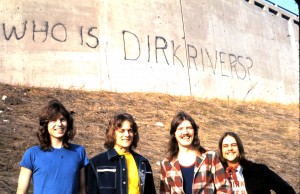
Who Is Dirk Rivers?
A friend of mine, Tom Shannon, is a record collector and historian. We were together at his house a few years ago discussing the Dirk Rivers Band. He handed me a Dirk Rivers 45 and asked me if I was on this record. At that time I was unaware of any released Dirk Rivers recordings . I looked at the song titles which were “All I Have to Show” and “Six Days on the Road.” I knew it was not anything that I had been involved with. Then it hit me that Bob and Dick and I had sung a song called “All I Have To Show” together at Queen Street. It was never part of the band’s onstage repertoire. Probably because it was a quiet, sweet, acoustic song that Bob (and Dick) wrote while Bob was wood shedding in his upstairs bedroom. He’d sometimes work alone for 10-15 hours, trying to get his musicianship to the next level, honing his guitar or banjo skills. We knew better than to interrupt him. It was like the mad scientist in his laboratory, but when he’d surface downstairs I knew that I was in for a pleasant surprise. Numerous times he showed me what he had developed after practicing so intently. It was magical.
DICK VOGEL: That record was recorded at Keith Gill’s A.L.B.O. studio at 5246 Plainfield N.E. It was released in 1990 on Ed Buchanan’s Rooby Records. It got a lot of airplay on WCUZ where Ed was a DJ at that time.
The Final Days of the First Dirk Rivers Band
DICK VOGEL: That job at Down the Street club in Park City (near Waukegon) was a killer. It was an “after hours” place. We played from 1 AM to 6 AM. We were used to being on stage from 9:30-1:30, so that job wore us down pretty quick.
KIM RUSH: Seems like bar flies and miscellaneous creeps from Chicago would end up there after the Chicago clubs would close down. All kinds of craziness was going down at that club. There was another club down the street from there that was similar. No houses nearby. Both were located near a service drive for the expressway. I recall coming home to Grand Rapids in late May of 1975, terribly run down. It seems like I was confined to bed for nearly a month after that. I could not even take a few steps without vomiting. I was so bad off that we had to cancel a gig or two. I felt so bad about letting you guys down, but simply could not do it! I can recall us all getting together and talking about getting ourselves in better shape after that. That never happened. You guys were ill, too, but recovered quicker.
We rarely gigged more than 3 weeks of the month at the very most, and were always scraping for money. If the band could make 1000 a week, split four ways minus expenses, we were lucky! Despite all of that, Dick was always ultra-generous with me and signed a note to get me a new Ampeg SVT amplifier at one time while we were together. That amp was expensive. Everyone helped each other. Toward the end, Bob had met Karen and was thinking seriously about marriage, and knew that he had to make a change in order to support himself and a family. Also, Dick Bichler had told us that he was involved with the band Kansas and that he had the ability to get us a recording contract. I think he liked our band, as he got us work at Thunderchicken and Putt-Putts. Of course, we were hoping that he would make good and get us a shot at recording. Bob had written some pop/rock tunes that were simple and catchy and Dick, Jerry and I thought these tunes would do the trick. But we ended up a bit disappointed with Dick Bichler, not that he owed us anything.
BOB VOGEL: That’s the time when our band broke up. I decided to get control of my life and created a new trio that could play a wider variety of gigs and work steady. I knew a guitarist named Mike Grattan whom I had met in college and he stepped in as the new bass player. We created a lounge band called the Vogel Brothers, and we played a chain of Holiday Inns and other places for a year or two.
DICK VOGEL: The manager of operations for Holiday Inn saw us play in Cadillac, noticed the large crowds we were drawing and found work for us all over the states.
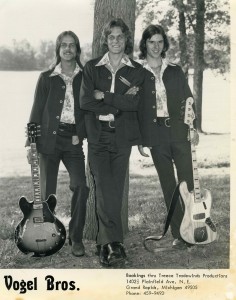
Vogel Brother Band (L-R) Bob Vogel, Dick Vogel, Mike Grattan
KIM RUSH: I went to see you guys in Holland at the Holiday Inn, about the time that you formed the trio. You had a good three- piece band, and Mike was a good bassist with a good sound, and a super nice person. I liked his sound so much that I looked him up in 1977 and bought the same bass he was playing that night I heard him in Holland. I still have that Fender Precision. In 1975 I bought a new white one while we were in Waukegan that would not stay in tune if you stood on top of it or beat the crap out of it. I was sure glad to get rid of that piece of firewood. I’m assuming that none of us knew there were such things as guitar technicians back then?
BOB VOGEL: After the Vogel Brothers Band we resurrected the Dirk Rivers name with Bob Reilly on bass and Rick Brown on guitar. Dirk underwent many personnel changes before I moved to Nashville in 1991. Dirk was very well known for having the biggest and “bad-est” sound system in West Michigan. When we started the band way back in ‘73 my goal was to become the greatest and most famous band in West Michigan. I don’t think anyone can throw much of an argument against our success.
Stay tuned for Part 3 of the Bob Vogel Story: Dirk Rivers; 1977-1991


2 Responses to Dirk Rivers “The Beginning”